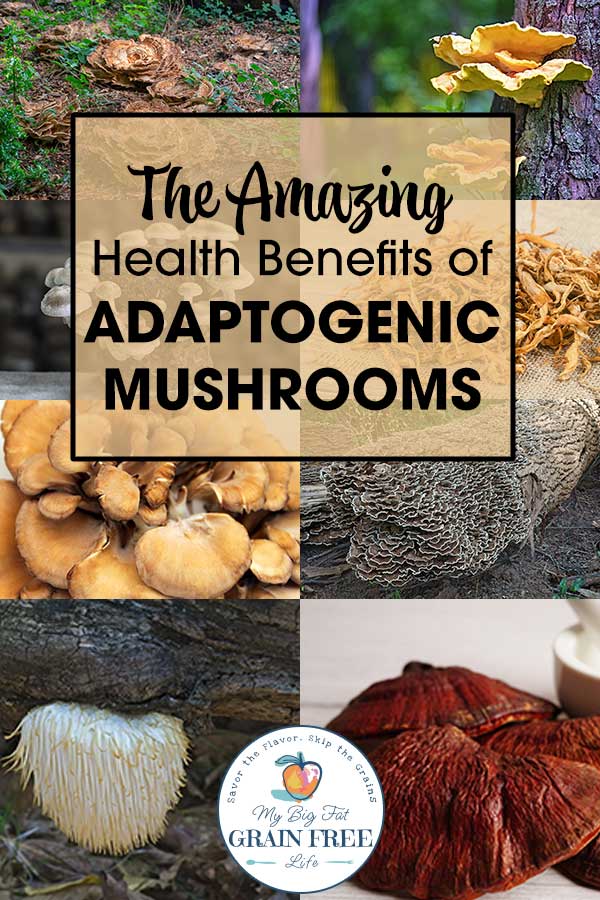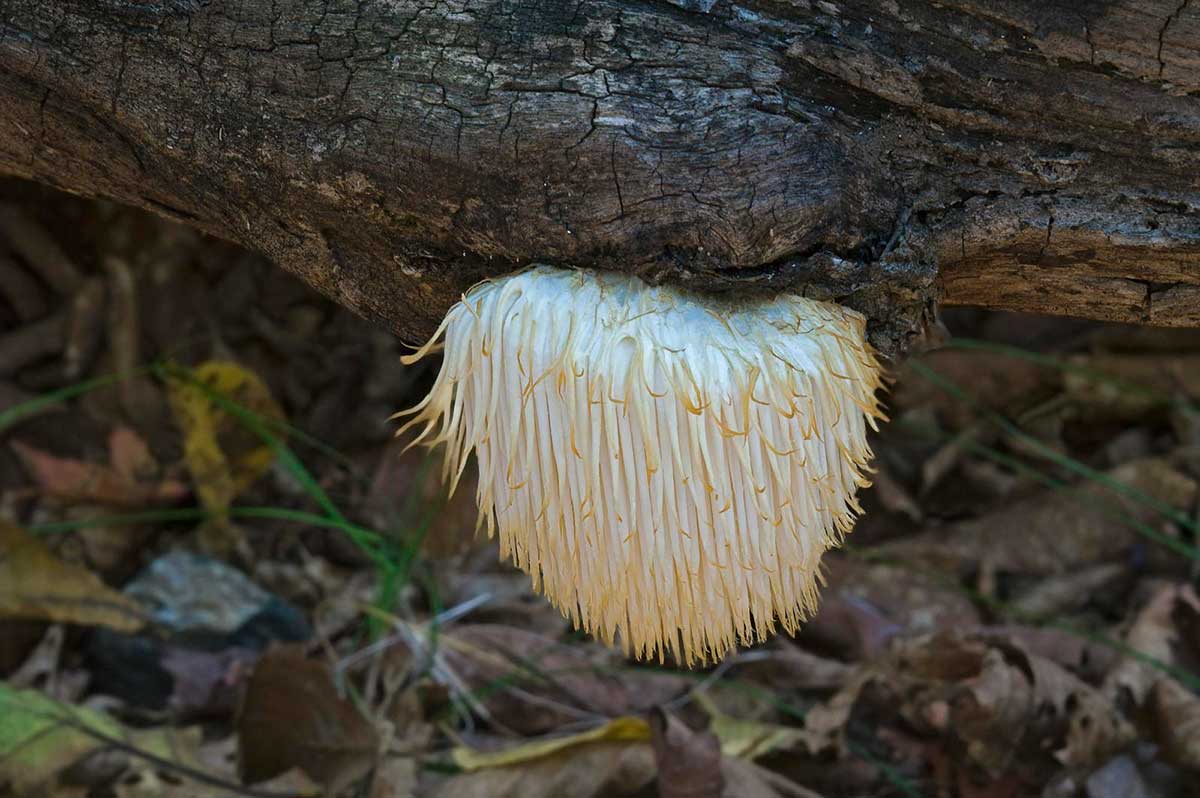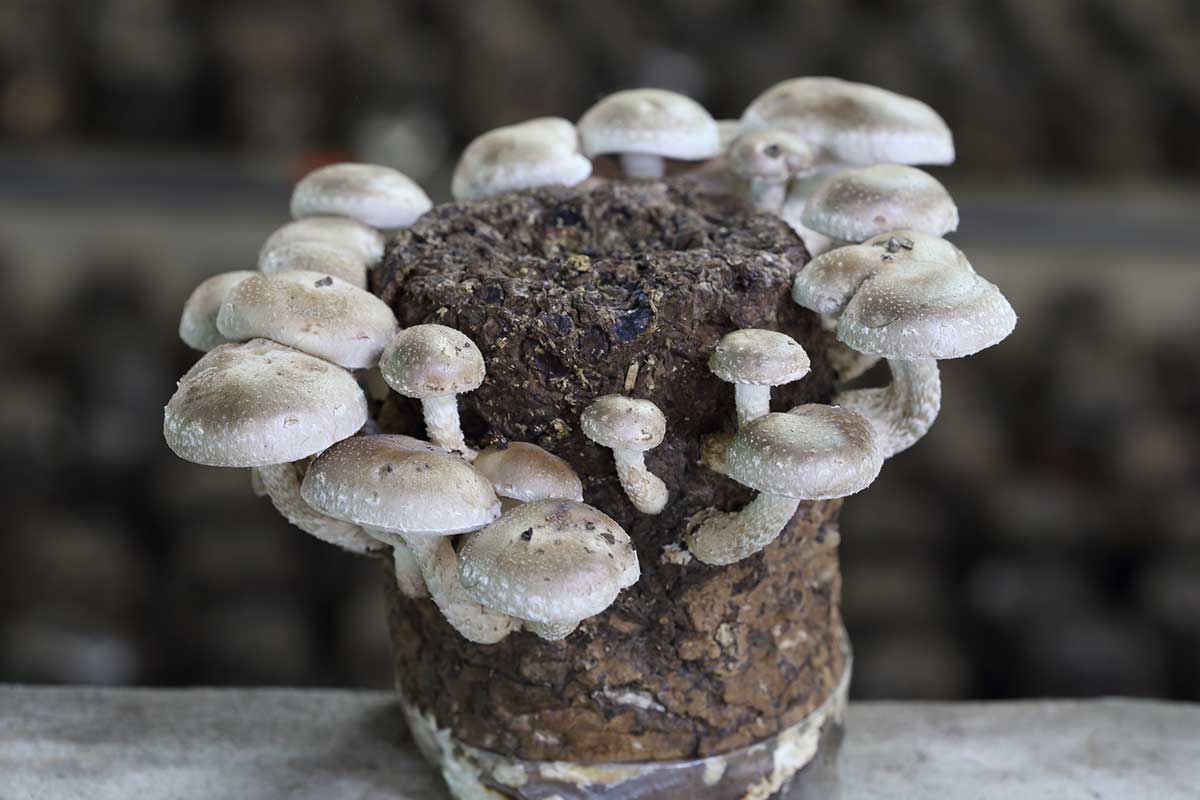The Amazing Health Benefits of Adaptogenic Mushrooms
This post may contain affiliate links. If you make purchase after clicking a link, I may receive a commission at no extra cost to you.
Last Updated on October 23, 2023
If you’ve been wondering what the fuss is about adaptogenic mushrooms, you’ve come to the right place! The truth is, adaptogenic mushrooms have been used in traditional Chinese medicine since ancient times. There are some amazing health benefits of adaptogenic mushrooms, so it’s no wonder things like “mushroom coffee” have become so trendy. Read on to learn more about adaptogens and the beneficial effects of consuming medicinal mushrooms.

Adaptogenic Mushrooms
It’s funny how adaptogenic mushrooms have been around for thousands of years, but they’ve recently became “trendy.” I have no doubt you have probably heard about mushroom coffee benefits. It’s true, there are lots of health benefits of adding functional mushrooms to coffee.
But that’s just the tip of the iceberg!
Before we explain about the different types of adaptogenic mushrooms and their health benefits, let’s first learn about adaptogens.
What Are Adaptogens?
Adaptogens are herbs or plants that help the body adapt to various stressors, both physical and mental. They work by regulating the body’s response to stress, promoting balance and resilience.
What Do Adaptogens Do for My Body?
One of the key ways in which adaptogens support the body is by helping to regulate our stress response system, as mentioned above.
When we encounter stressful situations our bodies release certain hormones like cortisol as part of the fight-or-flight response. While this response is essential for survival in acute situations, chronic exposure to high levels of stress can take a toll on our health.
Adaptogens actually help modulate our stress hormone levels and promote a more balanced state within the body. In other words, they can help bring us back into equilibrium when we’re feeling overwhelmed or exhausted.
What Are Adaptogenic Mushrooms?
These special mushrooms possess unique properties that help the body adapt and respond to various stressors without causing harmful side effects. They work by regulating and balancing key systems within our bodies, such as the immune system, nervous system, and endocrine system.
There are several types of adaptogenic mushrooms commonly used for their health benefits, such as; reishi mushroom, cordyceps mushroom, lion’s mane mushroom, chaga mushroom, turkey tail mushroom, shiitake mushroom, and maitake mushroom.
Each of these varieties has its own unique set of compounds that contribute to its therapeutic properties.
History of Medicinal Mushrooms
The use of medicinal mushrooms can be traced as far back as ancient China, where they’ve been using adaptogentic mushrooms for thousands of years. Chinese medical texts such as the Shennong Ben Cao Jing (Divine Farmer’s Materia Medica) mention several mushroom species and their therapeutic uses.
In traditional Japanese medicine, certain mushrooms like shiitake and maitake have been used for centuries to enhance vitality and boost the immune system. These mushrooms were highly regarded for their potential anti-inflammatory and anticancer effects.
Native American tribes also had a deep appreciation for the power of medicinal mushrooms. For example, the Chippewa tribe considered chaga mushroom sacred due to its believed healing properties. They would make tea from chaga to address various ailments including gastrointestinal issues and skin problems.
Adaptogenic Mushrooms
Some studies suggest that adaptogenic mushrooms may enhance immune function, improve cognitive performance (such as memory and focus), boost energy levels naturally without causing jitters or crashes like caffeine does, support healthy hormonal balance – particularly during times of hormonal fluctuations such as menopause – and even promote better sleep quality.

Cordyceps
Cordyceps primarily grow on high-altitude plateaus in regions such as Tibet and Nepal. They often thrive in areas with cool temperatures and ample moisture. They’ve been used in traditional Chinese medicine for centuries.
How Cordyceps Taste
Cordyceps have an earthy flavor with subtle hints of sweetness. Some describe it as mildly nutty or mushroom-like.
Health Benefits of Cordyceps
Studies suggest that these mushrooms may help enhance athletic performance by improving oxygen utilization and increasing endurance levels. Cordyceps also possess antioxidant properties that may support immune function and reduce inflammation in the body.
Furthermore, some research indicates that cordyceps may have anti-aging effects due to their ability to combat oxidative stress and promote cellular health.
Ways to Use Cordyceps
These medicinal mushrooms can be consumed through dietary supplements, such as capsules or powders. They’re also easily incorporated into daily routines by adding them to juices, teas, or to increase the health benefits of smoothies.

Lion’s Mane
Lion’s Mane is a type of edible mushroom that belongs to the Hericium genus. It is characterized by its unique appearance, resembling a lion’s mane with long, flowing white or cream-colored tendrils. This mushroom has gained popularity not only for its distinct look but also for its potential health benefits.
These functional mushrooms can be found both in the wild and cultivated commercially. They typically grow on hardwood trees like oak and maple, primarily during late summer through fall seasons.
How Lion’s Mane Tastes
Lion’s Mane offers a mild seafood-like flavor with hints of sweetness. Some people describe it as having a delicate aroma similar to crab or lobster meat. Its soft yet slightly chewy texture adds an interesting element to dishes.
Health Benefits of Lion’s Mane
Lion’s Mane mushrooms offer several potential health benefits. They are rich in antioxidants that help protect our cells against damage caused by harmful free radicals. Additionally, studies suggest that they may support brain health by stimulating nerve growth factor (NGF) production which plays a crucial role in maintaining healthy cognitive function.
Furthermore, some research indicates that consuming Lion’s Mane may have anti-inflammatory properties and could potentially enhance immune system function due to their bioactive compounds.
Ways to Use Lion’s Mane
There are various ways in which Lion’s Mane can be consumed. One common method is cooking it as an ingredient in dishes such as stir-fries, soups, and stews. It can also be used as a meat substitute due to its fibrous texture when cooked properly. Another way to enjoy Lion’s Mane is by consuming it raw in salads or blending it into smoothies for added nutritional value.
Lion’s Main functional mushrooms are often an adaptogen that’s included in mushroom coffee blends.

Reishi
This type of medicinal mushroom has been used for centuries in traditional Chinese medicine and has a long history of being highly valued for their potential health benefits.
Reishi mushrooms grow naturally on decaying logs and tree stumps in various parts of Asia, including China, Japan, Korea, and other countries with similar climates. However, due to their popularity and demand worldwide, they are now cultivated commercially as well.
How Reishi Tastes
Reishi mushrooms have a strong woody flavor that is often described as bitter or earthy. This distinct taste may not appeal to everyone but can be masked when combined with other ingredients if consumed as tea or added to recipes.
Health Benefits of Reishi
Reishi mushrooms contain bioactive compounds such as triterpenoids and polysaccharides that contribute to their potential therapeutic properties. These compounds have been studied for their antioxidant effects which help protect cells from damage caused by harmful free radicals.
Furthermore, research suggests that consuming Reishi may support immune function by stimulating certain white blood cells involved in fighting infections and diseases.
Ways to Use Reishi
Reishi mushrooms can be consumed in the form of capsules or powders, brewed into tea, and even incorporated into soups and stews to reap the benefits.

Chaga
Chaga mushrooms are a type of fungi that grow on the bark of birch trees in colder regions such as Siberia, Canada, and Northern Europe. Like the other medicinal mushrooms we cover in this article, they have been used for centuries in traditional medicine due to their potential health benefits.
How Chaga Tastes
Chaga mushrooms have a unique flavor profile that some describe it as earthy and woody with hints of vanilla or cinnamon.
Health Benefits of Chaga
Chaga mushrooms are believed to be rich in antioxidants which help protect our cells from damage caused by harmful free radicals. They also contain polysaccharides that support immune function and promote overall well-being.
Additionally, some studies suggest that consuming Chaga mushroom extracts may have anti-inflammatory properties and could potentially aid in managing certain chronic conditions like arthritis.
Ways to Use Chaga
There are several ways to consume Chaga mushrooms. One common method is by brewing them into a tea. To do this, you can simmer small pieces of dried Chaga mushroom in water for an extended period of time to extract its beneficial compounds. Another way to enjoy Chaga mushrooms is by adding powdered or ground Chaga to smoothies or coffee for an extra boost of nutrients.

Turkey Tail
Turkey Tail mushrooms, scientifically known as Trametes versicolor are named Turkey Tail due to their vibrant colors and unique pattern resembling the tail feathers of a wild turkey.
These mushrooms have a wide distribution across different continents including North America, Europe, Asia, and Australia. They typically grow on decaying hardwood logs or tree stumps in forests or woodland areas.
How Turkey Tail Tastes
Turkey Tail mushrooms aren’t particularly known for their bold flavors. In fact, they have a rather bland taste which makes them more suitable for infusions such as teas rather than standalone use in recipes.
Health Benefits of Turkey Tail
These fungi contain powerful compounds called polysaccharopeptides (PSP) and beta-glucans which possess immune-boosting properties. Consuming Turkey Tail mushroom products may help enhance your body’s defense against infections and diseases by supporting your immune system.
Moreover, research suggests that these mushrooms could potentially assist with cancer treatment by stimulating immune responses and reducing inflammation caused by chemotherapy. They are also rich in antioxidants that combat oxidative stress and promote overall well-being.
Ways to Use Turkey Tail
These mushrooms can be consumed in various ways. One common method is by brewing them into a tea or making an extract. This allows you to enjoy the benefits of Turkey Tail mushrooms without actually consuming the tough and woody texture of the mushroom itself. Additionally, they can also be added to soups, stews, or stir-fries after being properly cooked.

Shiitake
Shiitake mushrooms are a type of edible mushroom known for their unique taste and numerous health benefits. Originally cultivated in East Asia, shiitake mushrooms are now grown all over the world. They thrive best on decaying hardwood trees such as oak logs or sawdust blocks.
In nature, they are typically found growing on fallen tree trunks or branches.
How Shiitake Tastes
Shiitake mushrooms offer a nice balance of earthiness and umami flavors. They have a meaty texture with slightly chewy stems that soften when cooked. The caps of shiitakes tend to be richly flavored while the stems provide a more subtle taste.
Health Benefits of Shiitake
In terms of health benefits, shiitake mushrooms contain several nutrients that contribute to overall well-being. They are low in calories but high in fiber which aids digestion and promotes satiety. Additionally, these mushrooms contain vitamins B2 (riboflavin) and B3 (niacin), both important for energy production within the body.
Moreover, shiitakes possess compounds like polysaccharides beta-glucans that support immune function by activating certain cells responsible for fighting infections and diseases. These compounds also exhibit anti-inflammatory properties which may help reduce chronic inflammation associated with various health conditions.
Ways to Use Shiitake
These mushrooms can be consumed in various ways, making them very versatile. They can be sautéed, stir-fried, grilled, or even used as an ingredient in soups and stews. Shiitake mushrooms also make a great addition to pasta dishes, risottos, and salads.

Maitake
Maitake mushrooms, also known as dancing mushrooms or hen of the woods, have a distinct appearance with large, overlapping clusters of fan-shaped caps. They are native to Japan but can now be cultivated in different parts of the world. They typically grow at the base of oak trees or other hardwoods in cool climates during autumn.
How Maitake Tastes
Maitake mushrooms have a rich umami flavor with hints of nuttiness. Their texture is firm yet delicate when cooked properly.
Health Benefits of Maitake
Beyond their deliciousness, maitake mushrooms contain various nutrients such as vitamins B and C, potassium, fiber, and antioxidants like beta-glucans. These compounds have been associated with immune-boosting properties and may help lower blood sugar levels and support heart health.
Ways to Use Maitake
When it comes to consumption, there are various ways to enjoy maitake mushrooms. They can be sautéed in butter or oil until they become tender and golden brown. Maitakes can also be added to stir-fries, soups, stews, and pasta dishes for extra flavor and texture. Additionally, they can be roasted or grilled to enhance their earthy taste.
Ways to Use Adaptogenic Mushrooms
Ther are different ways you can get these special mushrooms into your diet. So, if you are not a fan of the flavor of mushrooms, don’t despair, you’ve got plenty of options.
Mushroom Coffee
Mushroom coffee is an excellent way to start your day with a boost of energy and focus. The combination of the natural compounds in both coffee and adaptogenic mushrooms can enhance mental clarity, support immune function, and promote overall well-being.
You can use a natural sweetener to make it taste delicious and your favorite plant based milk to make it creamy, like a latte or your favorite coffee drink.
Mushroom Tea
If you prefer a warm beverage without the caffeine kick, mushroom tea is an ideal option. Prepare by steeping dried or powdered adaptogenic mushrooms in hot water for 10-15 minutes before straining out the solids. Sip on this soothing infusion to enjoy its relaxing properties while benefiting from the immune-supporting effects of these medicinal fungi.

Capsules
For those who prefer convenience, adaptogenic mushroom capsules offer an easy way to incorporate them into your daily routine. These pre-measured doses contain concentrated extracts derived from high-quality medicinal mushrooms like reishi, lion’s mane, chaga, or cordyceps.
Gummies
Available in various flavors and shapes, these adaptogenic mushroom gummies are made using mushroom extracts combined with other natural ingredients like fruit juices or pectin for added nutritional value and delightful indulgence.
Tinctures
Tinctures provide another convenient method of consuming adaptogenic mushrooms‘ beneficial compounds quickly and effectively. Made by extracting active constituents from medicinal fungi using alcohol or glycerin, these liquid concentrates come with droppers that allow precise dosing. Simply add a few drops to a glass of infused water, juice, or your favorite drink and enjoy the benefits.
Powders
You can mix adaptogenic mushroom powders into chicory coffee, smoothies, sprinkle them over yogurt or hot cereal, or even incorporate them into homemade energy bars for an added nutritional punch. These powders retain the full spectrum of beneficial compounds found in adaptogenic mushrooms and provide a convenient way to harness their health-promoting properties.
Overall Health Benefits of Adaptogenic Mushrooms
Here are some of the ways these incredible mushrooms can benefit your health:
Boost Immune Function
Adaptogenic mushrooms help strengthen the immune system, making it more resilient against infections and diseases.
May Reduce Inflammation
These mushrooms possess anti-inflammatory compounds that can reduce chronic inflammation in the body.
Enhance Energy Levels
Adaptogens support adrenal function and help combat fatigue, providing a natural boost of energy.
Improve Mental Clarity
Many adaptogenic mushrooms have cognitive-enhancing effects, improving focus, memory, and overall brain function.
Support Stress Management
These powerful shrooms regulate cortisol levels and promote a sense of calmness during times of stress or anxiety.
Promote Restful Sleep
Certain adaptogens have sedative properties that can aid in achieving deep, quality sleep.
Balance Hormones
By supporting hormonal balance, adaptogenic mushrooms may alleviate symptoms associated with hormonal imbalances such as PMS or menopause.
Increase Endurance And Stamina
Regular consumption of adaptogens can enhance physical performance by boosting endurance and reducing exercise-induced fatigue.
Aid Digestion
Some medicinal mushrooms possess prebiotic fibers that nourish beneficial gut bacteria and improve digestive health.
Lower Blood Pressure Levels
Certain varieties like Reishi mushroom contain compounds which can help lower high blood pressure.
Support Liver Health
Adaptogens assist in detoxification processes within the liver.
Improve Cardiovascular Health
Some types like Chaga mushroom contains antioxidants which helps protect heart tissues from damage.
Enhance Respiratory Function
Medicinal Mushrooms like Cordyceps have been shown to improve lung capacity & oxygen uptake.
Strengthen Bones
Reishi mushroom has been found to stimulate osteoblasts, cells responsible for bone formation.
Promote Healthy Skin
Certain adaptogens can improve the appearance of your skin by reducing inflammation and boosting collagen production.
Aid Weight Management
Adaptogenic mushrooms can support a healthy metabolism and help regulate appetite, promoting weight loss or maintenance.
Support Liver Health
Adaptogenic mushrooms have detoxifying properties that assist in cleansing and supporting optimal liver function.
Improve Cardiovascular Health
Some adaptogens have been shown to lower cholesterol levels and reduce the risk of heart disease.
Enhance Immune Response Against Cancer
Studies suggest that certain adaptogenic mushrooms may have anti-cancer properties by stimulating immune responses against tumors.
Boost Overall Well-Being
Regular consumption of these powerful fungi promotes vitality, balance, and an overall sense of well-being.
FAQ About Adaptogenic Mushrooms
Still have questions about adaptogenic mushrooms? Here are some questions that are frequently wondered about medicinal mushrooms.
Which Part of the Mushrooms Do You Use?
When it comes to adaptogenic mushrooms, you can use the whole mushroom – from the cap to the stem. Each part of the mushroom contains different beneficial compounds that contribute to its adaptogenic properties.
The cap of the mushroom is often rich in polysaccharides, which are complex carbohydrates known for their immune-boosting and anti-inflammatory effects.
The stem of the mushroom, on the other hand, is usually packed with triterpenes. Triterpenes are bioactive compounds that have been shown to possess antioxidant and anti-stress properties. They can help regulate stress hormones in our body and provide a calming effect during times of anxiety or tension.
Do Adaptogenic Mushrooms Work?
While scientific research on adaptogenic mushrooms is still relatively limited compared to other areas of study, there is growing evidence suggesting their effectiveness. Several studies have shown promising results regarding the potential therapeutic properties of these mushrooms.
Are All Mushrooms Adaptogenic?
No, not all species of mushrooms are adaptogenic. While some types of mushrooms do have adaptogenic properties, such as reishi and cordyceps, it is important to note that adaptogens are a specific category of herbs or substances that help the body resist stressors and promote overall well-being.
Are Adaptogenic Mushrooms Hallucinogenic?
No, adaptogenic mushrooms are not hallucinogenic. While some types of mushrooms, such as psilocybin-containing varieties, have hallucinogenic properties and can alter perception and consciousness when consumed, adaptogenic mushrooms are a different category altogether.
Are Adaptogenic Mushrooms Safe?
Adaptogenic mushrooms are generally considered safe when consumed within recommended amounts. These types of mushrooms have been used for centuries in traditional medicine practices and have a long history of use without significant adverse effects.
However, it’s important to note that individual reactions may vary, and some people may be more sensitive to certain types of mushrooms than others. If you’re considering incorporating adaptogenic mushrooms into your diet or taking them as supplements, it’s always best to consult with a healthcare professional beforehand.
Additionally, make sure to purchase adaptogenic mushroom products from reputable sources that adhere to quality standards and conduct thorough testing for contaminants. This helps ensure the safety and purity of the product you’re consuming.
How Often Should You Consume Functional Mushrooms?
When it comes to consuming functional mushrooms, the frequency will depend on various factors such as your overall health, goals, and any specific recommendations from healthcare professionals.
In general, it is recommended to consume functional mushrooms regularly rather than sporadically in order to fully reap their potential benefits. However, there is no one-size-fits-all answer to how often you should consume them. It’s important to listen to your body and adjust accordingly.
If you’re new to incorporating functional mushrooms into your diet, start with smaller amounts and gradually increase the dosage over time. This allows your body to adapt and ensures that you don’t experience any adverse reactions.
What Are the Side Effects of Adaptogenic Mushrooms?
While they are generally considered safe, it is important to be aware of any potential side effects.
- Allergic Reactions: Some individuals may experience allergic reactions when consuming adaptogenic mushrooms. Symptoms can range from mild itching or rash to more severe symptoms like difficulty breathing or swelling. If you have a known allergy to mushrooms or other fungi, it is best to avoid adaptogenic mushroom supplements.
- Digestive Issues: In rare cases, certain types of adaptogenic mushrooms may cause digestive issues such as bloating, gas, or stomach discomfort. This could be due to individual sensitivities or intolerances.
- Interactions with Medications: Adaptogenic mushrooms may interact with certain medications such as blood thinners or immunosuppressants. It is important to consult with your healthcare provider before incorporating these mushrooms into your routine if you are taking any prescription medications.
- Hormonal Effects: Some research suggests that certain adaptogenic mushrooms might influence hormone levels in the body, particularly those related to the endocrine system and the thyroid gland. If you have a pre-existing hormonal imbalance or thyroid condition, it’s advisable to speak with a healthcare professional before using these supplements regularly.
- Blood Pressure and Blood Sugar Regulation: Certain varieties of adaptogenic mushrooms have been associated with blood pressure regulation and blood sugar control effects on some individuals who already suffer from low blood pressure (hypotension)or hypoglycemia (low blood sugar). Monitoring your levels closely while using these supplements is recommended if you fall into one of these categories.
It’s worth noting that everyone reacts differently, and not all individuals will experience these side effects when consuming adaptogenic mushrooms; however, being aware of them allows for informed decision-making regarding their use.
If you experience any concerning symptoms or side effects after consuming adaptogenic mushrooms, it is important to discontinue use and consult with a healthcare professional for further guidance.
Other Types of Adaptogens
- American Ginseng
- Asian Ginseng
- Ashwagandha
- Astragalus
- Eleuthero Root
- Goji Berry
- Jiaogulan
- Licorice Root
- Rhodiola
- Schisandra Berry
- Tulsi / Holy Basil
- Turmeric
Sources
- https://my.clevelandclinic.org/health/drugs/22361-adaptogens
- https://www.ncbi.nlm.nih.gov/pmc/articles/pmc9328747/
- https://doi.org/10.3390/nu13082861
- https://doi.org/10.1080/07315724.2014.950391
- https://doi.org/10.1155/2019/6212673
- https://www.healthline.com/nutrition/cordyceps-benefits
- https://www.verywellhealth.com/benefits-of-cordyceps-89441
- https://www.forbes.com/health/body/health-benefits-of-lions-mane
- https://www.healthline.com/nutrition/reishi-mushroom-benefits
- https://www.medicalnewstoday.com/articles/318527
- https://www.verywellhealth.com/turkey-tail-mushroom-6890534
- https://draxe.com/nutrition/shiitake-mushrooms
- https://www.healthline.com/health/stress/smart-girls-guide-to-adaptogens








